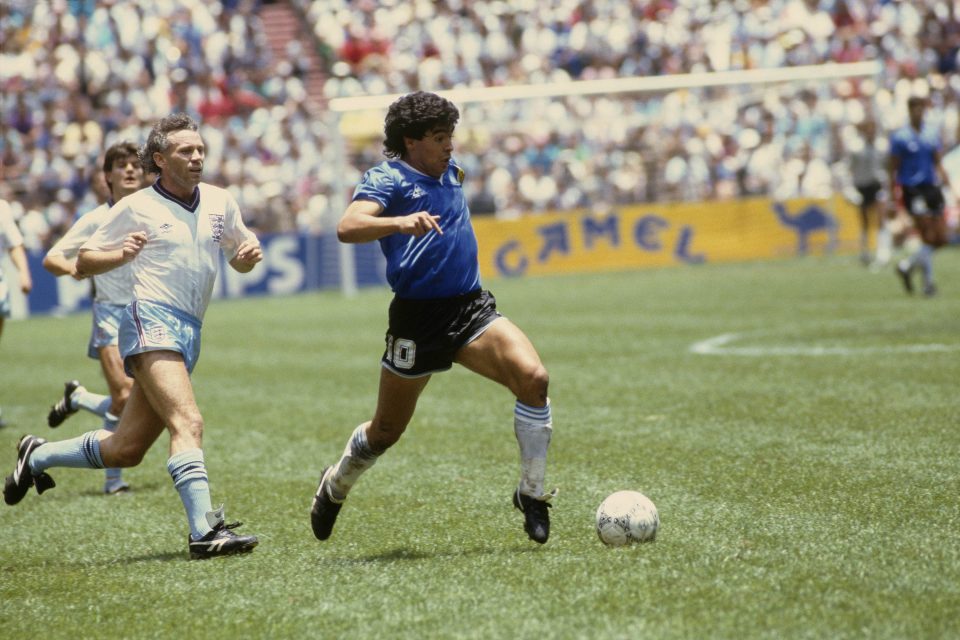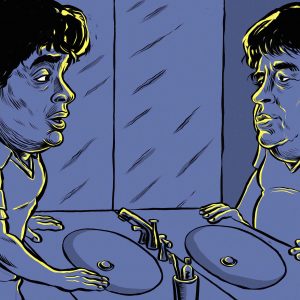The low beauty of Diego Maradona
The late Argentine legend was an angel with horns – we loved him all the more for his failings and outrages.
Author:
27 November 2020

Diego Maradona was low. He was close to the ground in every sense. First, his physique: he was hobbitish, a shrunken Hulk, comically bottom-heavy, but all that stubby weight was charged with a surging lightness.
He was a genius of proprioception, the miraculous neurological system we all possess to a lesser or greater extent. Some call it the sixth sense, the body’s live-streamed internal record of every body part’s position in space. An ever-changing diagram drawn by the inner ear in dialogue with the brain, and drawn entirely without the supporting evidence of vision.
Maradona turned that diagram into an animation. His proprioception went much further into the future than that of his enemies. You could see it happening in those tiny lulls in his dribbles, those thick, weird microseconds in which his momentum seemed to be dragging and freezing but was, in fact, being cached for imminent and murderous release.
Every chunky muscle in his body was always imagining three contractions and relaxations ahead, projecting and considering its much later locations and orientations, while his enemy’s muscles were stuck in the soupy present. Maradona had Nerve with a capital N.
The nerves are just employees of the brain, and Maradona was as smart as a short whip. Of course he wasn’t worldly. He had none of the emotional steadiness and maturity of a Pele or a Messi. Of course he was a hapless junkie and a man-child and a ridiculously bad loser. But his chronic childishness contained an incisiveness that any parent of young children will recognise: the incisive naivety that sees hypocrisies and absurdities that adults don’t see, or conveniently choose not to. The Id can face things that the superego can’t.
Related article:
Would Messi or Pele have met the pope of the day and told him to sell the gold-embossed ceilings of his Vatican palace if he cared so much about the plight of poor children, as he claimed to have done? “Sell your ceiling then, amigo, do something!” said Maradona. Not a chance would Messi or Pele have said that. Both would have diligently smooched the papal arse. But Maradona told us he had said that.
Unless, of course, he was lying. Maradona loved telling awkward lies as much as he loved telling awkward truths. For example, he is responsible for seeding football’s contemporary diving culture. The difference with Maradona is that in the football dark ages of the 1980s, the bastards were genuinely assaulting him. They nearly kicked the cocaine out of him. He embellished his collapses in self-defence. Most of his dives weren’t dives at all, they were mimed affidavits at the scene of the crime.
An angel with horns
Even so, he loved his dark side, and so did we all. He was an angel with horns, a calculating martyr whose off-pitch calculations were always off. Throughout the peak years of his playing career, between 1984 and 1991, he filled his leisure hours with snorting, boozing, sleeping around, crooning and bullshitting. The Camorra Mafia saw him coming even before he landed in Naples. They bought his sweet soul with a ton of fine coke, heavily cut with flattery and fear.
Despite his progressive politics, Maradona’s moral centre of gravity was as deliciously low as his physical centre of gravity. For a time in the late 1980s, he carried a secret plastic penis and a sachet of innocent piss to defraud the urine testers. The apparatus was nestled in his gym-bag pharmacy of prescribed and procured medications. He loved painkillers and stimulants: cheat the pain, then cheat the enemy.
Related article:
In contrast to all those great footballers who have risen from a ghetto and seduced the elites with their respectability, Maradona was incurably indecent, seductively dishonorable, in the grand tradition of George Best and Garrincha. Ever since he fell into a cesspool of sewage as a tiny tot in Villa Fiorito, he was unable or unwilling to sanitise himself.
Always, he obeyed pleasure, guile and transgression: the dark territory of radical creativity. Being an admirable human being was too boring a project for him to consider. That’s why we loved watching him. He carried a glitter of villainy on to the pitch. You never knew what he would do.
Today’s two competitors for the title of the greatest player ever – Cristiano Ronaldo and Lionel Messi – have shadows about them, too. Millions of people disdain them both, for different reasons.
They deserve their glories, to be sure. Ronaldo and Messi have scaled all but one of the heights of the game. But you know what they will do. And they lack the low beauty of Maradona.


